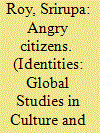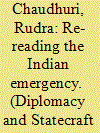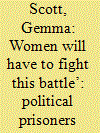| Srl | Item |
| 1 |
ID:
144173


|
|
|
|
|
| Summary/Abstract |
This article examines the emergence of the angry citizen as a legitimate political actor in post-colonial Indian democracy. Approaching such ‘civic anger’ as a historically constituted and socio-politically embedded formation rather than as a subjectively and individually experienced feeling, I show that the rise of the angry citizen was linked to the consolidation of a distinctive politics of curative democracy in the ‘long 1970s’. The lineages of the civic anger of twenty-first century India may be traced to this older formation of curative democracy. The point here is not to offer a chronological revision of the origins of ‘new India’, but to consider the generalisable political implications of the idea of curative democracy, and to identify the distinctive forms of political agency that are associated with the call to cure, reform or renew democracy.
|
|
|
|
|
|
|
|
|
|
|
|
|
|
|
|
| 2 |
ID:
129529


|
|
|
|
|
| Publication |
2014.
|
| Summary/Abstract |
The urban clearance programmes that were pursued on a vast scale during the Emergency are frequently alluded to by historians but remain poorly understood. In particular, historians have reproduced the assumptions and limited scope of the Shah Commission of Inquiry, which published its reports on the Emergency in 1978. Histories of the Emergency's urban policies have, therefore, focused overwhelmingly on Delhi and north India, on the demolition of buildings, and on the role of Prime Minister Indira Gandhi's son, Sanjay Gandhi, as instigator of these policies. This article uses case studies to demonstrate that these policies were not limited to Delhi and its environs, and to show that a concentration on the demolition of buildings has led historians to neglect the clearing of unwanted people from India's cities. The article goes on to reassess the thinking that underpinned these policies through a case study of Jagmohan, the head of the Delhi Development Authority during the Emergency. It shows how his ideas on urban aesthetics and civics informed the urban clearance programmes and how these authoritarian republican ideas suggest a way of rethinking the history of the Emergency as a whole.
|
|
|
|
|
|
|
|
|
|
|
|
|
|
|
|
| 3 |
ID:
161043


|
|
|
|
|
| Summary/Abstract |
The period known as the “Emergency” in India—June 1975 to March 1977—is widely recognised as one of the darkest episodes in the nation’s 70-year history. Fundamental rights were suspended, whilst the courts had little or no authority. The security services received emergency powers to make arrests without explanation. Although the political, social, and economic history of the Emergency remains well known, there is nothing on the international history of this period. This analysis provides the first contribution to its diplomatic history. Examining the role played by the United States and Britain, in particular, finds basis largely on declassified papers available in the Indian, American, and British national archives as well as a survey of over 300 newspaper articles on and around the Indian Emergency.
|
|
|
|
|
|
|
|
|
|
|
|
|
|
|
|
| 4 |
ID:
161151


|
|
|
|
|
| Summary/Abstract |
During India’s infamous period of Emergency (1975–1977), Indira Gandhi’s government criminalised opposition and used preventive detention legislation extensively to repress dissent. Existing scholarship on this policy and on the Emergency more broadly pays little attention to women’s experiences. This paper draws on a unique collection of letters sent to and from female political prisoners in Maharashtra, exploring their experiences of incarceration under this regime. It offers new insights into the scale on which authorities detained women in this state and highlights ways that these political prisoners actively resisted Emergency rule. The paper also challenges the idea that the prison was an entirely repressive space for the Emergency’s detenues. These letters document attempts to exert agency over constructions of the prison space, highlight its permeable boundaries and reveal lively communities and cultures of resistance.
|
|
|
|
|
|
|
|
|
|
|
|
|
|
|
|